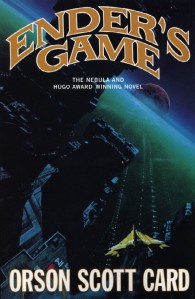 Ender’s Game is a hard book to review. It’s considered one of the classics of the science fiction genre, so what do I have to say about it that hasn’t already been said?
Ender’s Game is a hard book to review. It’s considered one of the classics of the science fiction genre, so what do I have to say about it that hasn’t already been said?
Since the movie of the book came out last November, you probably already know how the story goes. Ender is a super-intelligent child, probably genetically engineered, who’s destined to lead Earth’s military forces against an alien insectoid race. At the age of six, he’s enrolled in Battle School with a bunch of other superkids. The teachers put them through war games that get ever more grueling until everything goes horribly wrong – or horribly right, depending whose side you’re on.
This book was just as hard to read as it is to review. One of the reasons is that Ender’s Game was never really meant to be a novel. Orson Scott Card originally published this story as a short story in 1977, then later beefed it up so he could write the sequel, Speaker for the Dead. It shows in the pacing, which goes by in fits and starts. And the ending is bizarre by a novel’s standards. Throughout the book, Ender makes the same mistake over and over again. He only means to beat his opponent, but he beats him so thoroughly he winds up killing him. At the climax of the story, Ender makes the same mistake, big time. It’s only in the denouement that he starts to change and get better.
But the biggest reason this book was so hard to read is that it’s chillingly real. Orson Scott Card is a skilled writer and he puts you through the hell on earth Ender has to go through. In my edition of Ender’s Game, Card writes in an introduction that the book’s become a manifesto for gifted children. Of course I’m nowhere near as smart as Ender, but I was a gifted child. I knew that same alienation and embarrassment when I’d run circles around my classmates academically, so the book struck close to home. Petra could have been me.
Should Ender’s Game be a manifesto for gifted children? Ender is no role model. Ender commits atrocities, and the book is never totally clear whether Ender’s a monster or just unlucky. Would any bright kid in Ender’s situation have done the same things? Does the book condone this?
I don’t know, but I want to add that I watched the movie at the same time as I read the book. It’s never destined to be classic cinema, but the movie was good. It fixed the pacing issues and lightened the story up a lot. Fine with me. It’s a great way to chase out nightmares after you’ve read the book.
One final note: the book wound up undercutting its own scariness, completely by accident. I couldn’t help snickering every single time one of the characters mentioned the Buggers. *snerk* Buggers!
